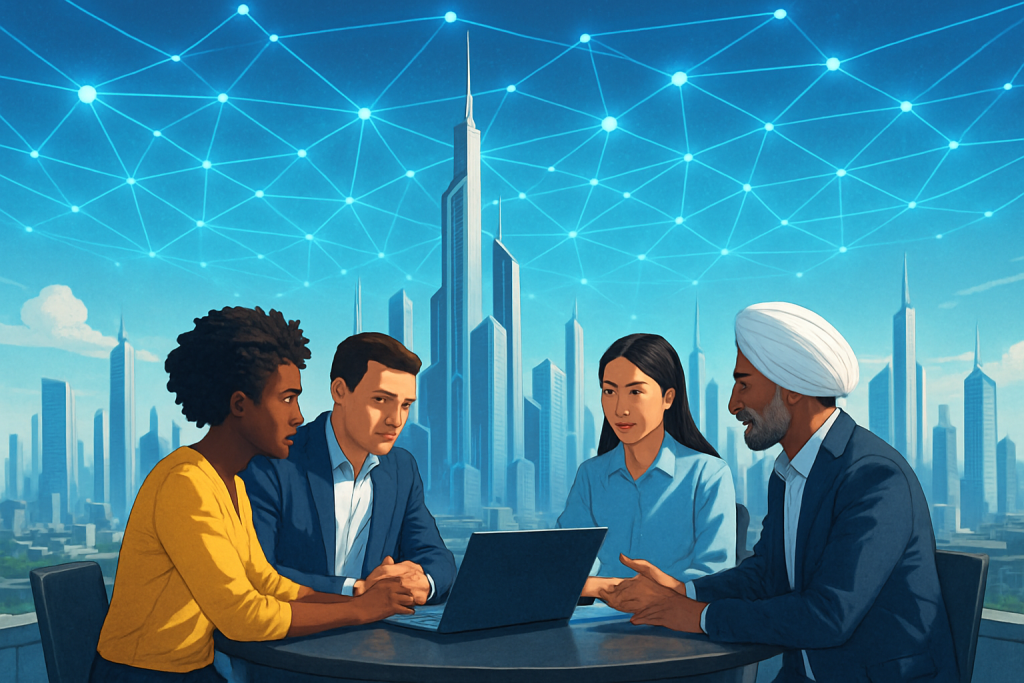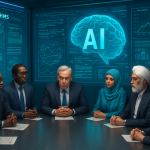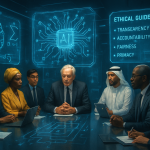The year is 2025. Flying cars are still a distant dream (thanks, Elon!), but artificial intelligence is woven into the fabric of our lives, from composing symphonies to diagnosing rare diseases. But who gets to write the rules of this AI-powered world? That question was thrown into sharp relief this week at the World Artificial Intelligence Conference (WAIC) in Shanghai. Forget robot butlers; the real story is about global power plays and the future of AI governance.
Premier Li Qiang, speaking at the WAIC, proposed a new international organization dedicated to AI cooperation. Think of it as the Avengers Initiative, but for algorithms. Except, instead of fighting Ultron, they’re tackling the knotty problems of AI ethics, access, and regulation. And unlike the Avengers, there’s a clear geopolitical subtext: China wants to lead the charge, offering an alternative to the U.S.-dominated landscape.
The WAIC itself is a sprawling showcase of all things AI, a sort of tech-fueled World’s Fair. This year’s theme, “Global Solidarity in the AI Era,” was less about Kumbaya and more about staking claims. Over 800 companies, including Chinese heavyweights like Huawei and Alibaba, and international players like Tesla, Google, and Amazon, descended on Shanghai to flaunt their latest AI wizardry. From large language models that could write the next great American novel (or at least a decent marketing email) to AI-powered robots that could probably beat you at chess (again), the conference was a glimpse into a future that feels both exhilarating and slightly terrifying.
But beyond the shiny demos and the promises of a brighter, AI-optimized tomorrow, Premier Li’s proposal has serious implications. He voiced concerns about AI becoming the exclusive domain of a select few nations and mega-corporations. It’s a sentiment echoing the anxieties we’ve all felt watching the tech giants amass more and more power. The fear is that AI, like any powerful technology, could exacerbate existing inequalities, leaving the Global South behind in a digital dust cloud. Li argued for a globally coordinated approach, ensuring that AI benefits everyone, not just the tech elite.
What exactly would this new organization do? Well, the devil’s in the details, but the broad strokes are clear. It would aim to: coordinate global AI governance, addressing the current patchwork of regulations and ethical guidelines; promote equitable access to AI technologies, ensuring that smaller countries and companies have a fair shot; and encourage international collaboration, fostering cooperation between governments, industries, and universities.
China even released an action plan, inviting participation from all stakeholders and proposing Shanghai as the organization’s headquarters. It’s a bold move, signaling China’s ambition to not just be a player in the AI game, but to shape its very rules. This includes establishing a cross-border open-source community, echoing the spirit of Linux and other collaborative software projects. The idea is that by sharing knowledge and resources, the world can collectively build a better, more equitable AI ecosystem.
Of course, this proposal doesn’t exist in a vacuum. It’s happening against the backdrop of intense technological competition between China and the United States. AI is the new space race, a high-stakes battle for technological supremacy. The U.S. has already imposed export restrictions on advanced technology to China, particularly high-end AI chips from Nvidia, citing national security concerns. It’s a digital cold war, with AI as the ultimate weapon. Despite these restrictions, China has been making impressive progress in AI development, proving that necessity is indeed the mother of invention.
So, what are the potential consequences of this new organization? It could reshape the global AI landscape, influencing how countries collaborate and compete. Imagine a world where AI standards and ethical guidelines are set not by a single nation, but by a diverse coalition of countries. It could lead to a more inclusive and equitable distribution of AI benefits, empowering developing nations and fostering innovation in unexpected places. Or, it could become another arena for geopolitical maneuvering, a battleground for influence and control. The truth, as always, is likely somewhere in between.
Premier Li’s proposal raises some profound questions about the future of AI. Who gets to decide what AI looks like? Who benefits from its development? And how do we ensure that AI is used for good, not for ill? These are not just technical questions; they are deeply political, ethical, and philosophical. As AI becomes increasingly powerful, we need a global conversation about its role in our lives, and China’s proposal is a significant step in that direction. Whether it leads to genuine cooperation or further fragmentation remains to be seen. But one thing is clear: the AI revolution is not just about technology; it’s about power, influence, and the future of humanity.
Discover more from Just Buzz
Subscribe to get the latest posts sent to your email.


